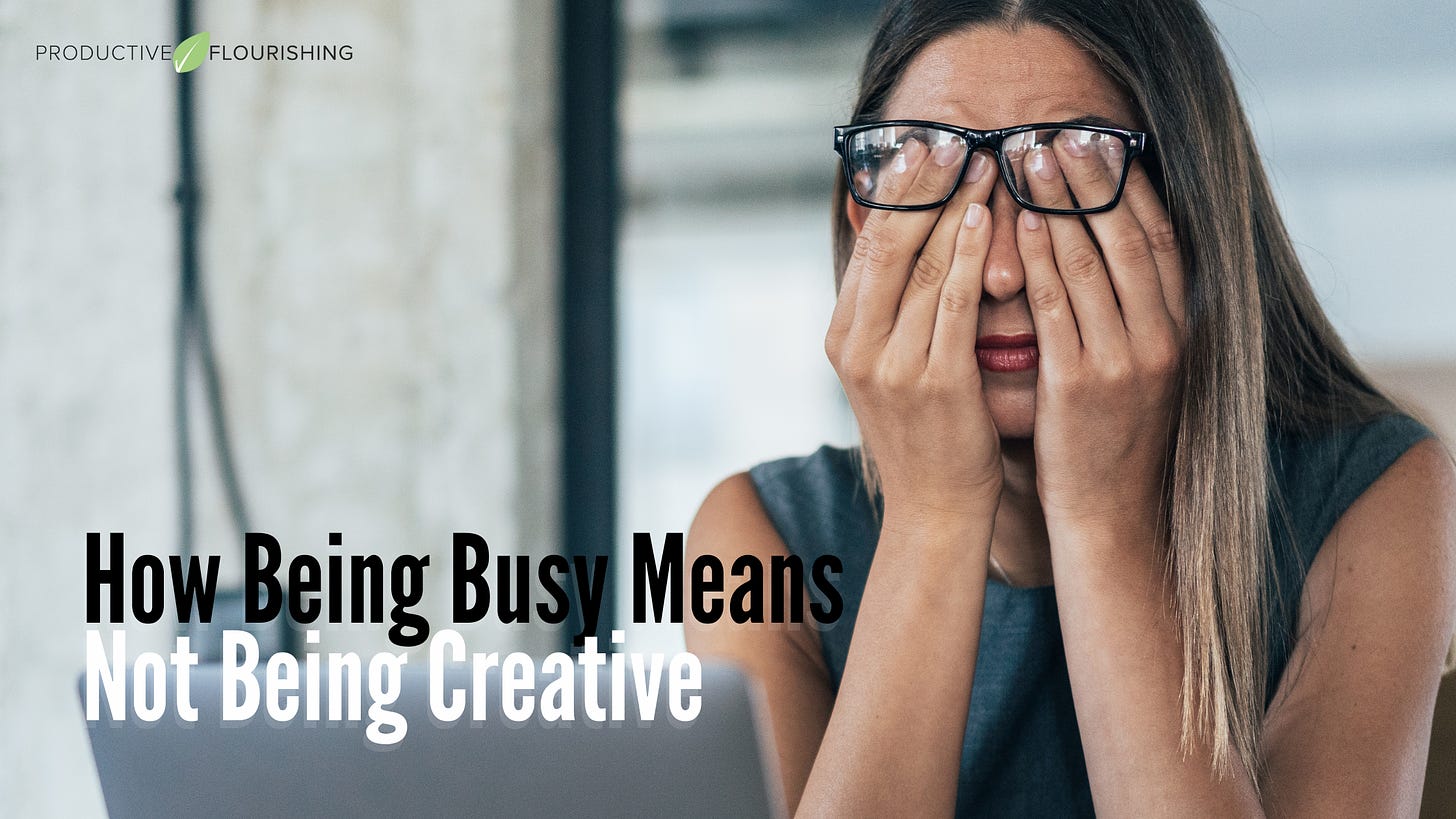How Being Busy Means Not Being Creative
Unpopular opinion: It's possible, indeed, easy, to be very busy and active without producing something worthwhile
Editor's note: This is a guest post by Ali Luke from Aliventures.
Here’s a word: productive.
Here’s another word: busy.
All too often, we act as though those two words mean the same thing. But they don’t: being productive doesn’t equal being busy. And the correlation between productive and busy is weak at best: being busier doesn’t necessarily make you more productive.
Here’s a third word: creative.
Add that one into the mix, and things turn sour. I’ll spare you the Venn diagram, but busy and creative don’t tend to overlap.
You’ve probably experienced this first hand. You have a creative thing which you do, a process where you make something unique and put something of yourself, your individuality, into it. When you’re busy, that creativity stalls. When your mind is on the dozen other things you need to get done, you’re locked out from that creative zone.
Busyness is antithetical to creativity. If you’ve ever tried to force creativity, you’ll know this. Chances are, you can push onwards, cramming your creative work into thin slices of time, but it’s like driving with the handbrake on: it’s not doing you, or your work, any good.
Busyness is Shallow
When you’re busy, your attention is constantly on the moment. You obsess over this half-hour, this email, this task on the to-do list, and your focus isn’t on enjoying each task and giving it the value it needs — but on getting through it so that you can get on with the next thing.
You end up focusing on what needs to be done today – rather than on what you want to achieve this year. Busyness can be seductive: it offers a caffeine-like buzz of scrambled thoughts; it can be a way to show off to the people around you; it may even reassure you that you’re a good and productive person.
Being busy means adopting tunnel vision, constantly focusing ahead, with no time to deviate, to wander, to glance at the richness and the possibilities all around you.
When you’re busy, you miss out on getting any real depth. Maybe you end up cutting out time you’d spend in meditation, prayer or reading. You find yourself putting off creating until another day. That novel stays in the bottom drawer. That painting gathers dust in your studio.
Busyness Stops You Dreaming
My creative material is words, and a good portion of those are spent on fiction. I’m taking a part-time MA in creative writing, learning from some great and generous authors. One theme which comes up often is the need to dream. Creativity activity is fundamentally different from much of what we do when we’re busy. Whether you work with words or paint, pixels or code, your creativity comes from somewhere beneath the surface chatter of conscious thoughts.
During your life, you’ll have had ideas come to you at the most unexpected times, often when your mind isn’t on anything in particular. Whatever does it for you – country walks, long baths, meditation, exploration, daydreaming – there’s a fair chance that, when you’re busy, those gaps of time get crushed out of your life.
When you go into a creative session, it takes a while to get into flow. If my mind is too clogged with what’s already happened in the day, or if I know I’ve got other things to finish before bed, it’s very hard to enter that creative zone.
Productivity Isn’t About Outputs
When we get in a tangle and try to match up creativity with productiveness with busyness, it’s often because we’ve been taught to align productivity with outputs – particularly measurable outputs: words written, hours worked, widgets cranked.
But being productive isn’t about being able to point to items ticked off on a to-do list. It’s possible, indeed, easy, to be very busy and active without producing anything worthwhile. You could train yourself to type faster and write two thousand words an hour, but they’ll never be great literature; chances are, they’ll never even be publishable.
Creating a single stunning painting, or a single haunting piece of music, is far more “productive” than trying to make ten mediocre ones.
Being truly productive often means eschewing busyness. That may mean making sacrifices (financial or otherwise) for the sake of having the necessary space to create. It may mean being deliberately, even brazenly, counter-culture by insisting that more is not better, and by finding your own meaning rather than letting society dictate your life to you.
What would you rather leave when you’re gone — an empty inbox, or a masterpiece that touches the lives of people you’ll never meet?




